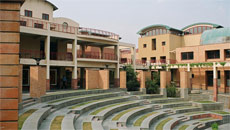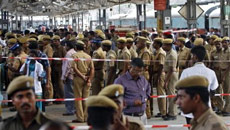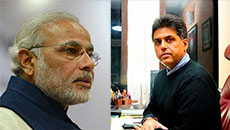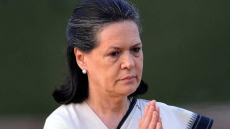Here's another traditional male bastion set to crumble. With a Supreme Court prod, the renowned 900-year old Vitthoba Temple in the pilgrim town of Pandharpur will script religious history when it appoints its first women priests as also priests from the backward classes as part of an inclusive mission.
"This is the first initiative in the country by any temple trust to break the centuries-old monopoly of the Brahmins over the temple puja and other rituals. We are keen that puja and rituals should be thrown open to all castes, especially non-Brahmins," Anna Dange, chairman of the Vitthal Rukmini Temple Trust (VRTT) explained to IANS.
The VRTT advertised this week, inviting applications for eight posts of priests from all practising Hindus and women well-versed in the two-or-three special pujas for Lord Vitthoba and his consort Rukmini, besides other temple rites and rituals.
"We shall interview the candidates May 18 and finalise the appointments which shall be purely temporary and contractual with the remuneration depending on the merits of those selected," said Dange.
The VRTT move was prompted by a Supreme Court judgement in January in a four-decade- old litigation dismissing the claims of exclusive ancestral rights over the earnings and rituals at the temple by the Badve and Utpat families here.
The two families had challenged the decision of the state government to take over the temple in 1968 after the recommendations of the B.D. Nadkarni Committee.
A former cabinet minister in Maharashtra, Dange said that the apex court's verdict has already brought about a seachange in the past few months in the earnings of the temple, situated around 350 km southeast of Mumbai.
"Earlier, the two families used to auction the daily pujas for the two presiding deities starting at Rs.7,000 ($117) for Rukmini and Rs.20,000 for Lord Vitthoba. They kept the daily earnings which were around Rs.150,000 and grew manifold on special occasions and festivals. Now, all the money is coming to the VRTT. This year, the temple income will be more than five crore rupees," Dange said.

The VRTT has been flooded with applications and many are ready to work free as they consider it a "divine service", Dange said with a smile. The excited applicants are said to hail from OBCs, Marathas, the scheduled castes and scheduled tribes and other castes.
The temple hosts the idol of Lord Vitthoba, a local version of Lord Krishna, and his consort Rukmini, and is revered by the 150,000-strong population of the town.
It has a unique scripture on its walls dating to 1195 on which the devotees would rub their backs to free themselves from the cycles of re-birth.
Attracting around 30,000 devotees from Maharashtra and other parts of India every day, the temple atmosphere is festive during four annual pilgrimages when around nearly two million devotees daily throng there.
On Navratri and Dassehra, the deities look spectacular daily with new clothes and jewellery, with lights and decorations that reflect in the serene waters of the Bhima river on whose banks the temple stands, Dange told IANS.
Incidentally, the world-famous 200,000 dabbawalas of Mumbai are staunch devotees of Lord Vitthoba and Rukmini and they take a brief vacation for their annual 'jatras' to Pandharpur.

The dabbawalas belong to the clan of 'Varkaris' who walk hundreds of kilometres from different parts of the state in processions taking two-three weeks during the Hindu months of Chaitra (March-April), Ashadhi (June-July), Karthik (October-November) and Maghi (January-February).
A trip to Pandharpur means a visit to some other famous temples in and around the town, including the Goddess Tulja Bhavani Temple, the family diety of the great Maratha warrior king Chhatrapati Shivaji; Shri Swami Samarth Temple; Lord Shri Kshetra Temple and Lord Dattatreya Temple.





